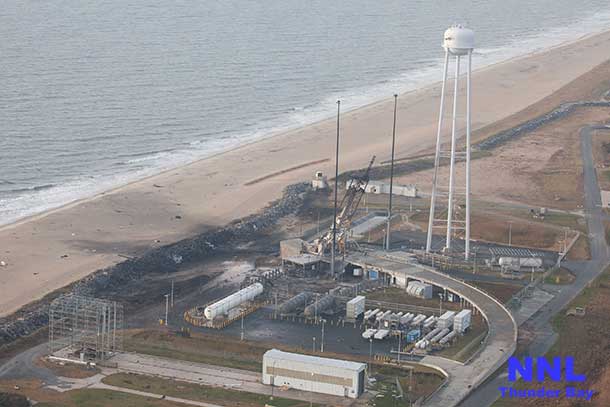
No injuries reported in Antares rocket explosion
WASHINGTON – TECH – The investigation into the explosion during launch of the Antares Rocket is continuing. NASA says that while no one was injured as a result of the spectacular explosion of the vehicle, the damage to the launch site is significant.
Fifteen seconds after liftoff, the explosion brought the unmanned Antares rocket falling to the ground Tuesday night. The fireball from what NASA officials called a “Catastrophic failure” lit up the sky at the Wallops Flight Facility in Virginia.
Officials expressed disappointment in the launch failure but gratitude that no one was injured.

Image Credit: NASA/Terry Zaperach
The incident marked the first accident since NASA turned to private operators to deliver cargo to the International Space Station.
The Wallops Incident Response Team completed today an initial assessment of Wallops Island, Virginia, following the catastrophic failure of Orbital Science Corp.’s Antares rocket shortly after liftoff at 6:22PM EDT Tuesday, Oct. 28, from Pad 0A of the Mid-Atlantic Regional Spaceport at NASA’s Wallops Flight Facility in Virginia.
“I want to praise the launch team, range safety, all of our emergency responders and those who provided mutual aid and support on a highly-professional response that ensured the safety of our most important resource — our people,” said Bill Wrobel, Wallops director. “In the coming days and weeks ahead, we’ll continue to assess the damage on the island and begin the process of moving forward to restore our space launch capabilities. There’s no doubt in my mind that we will rebound stronger than ever.”
The initial assessment is a cursory look; it will take many more weeks to further understand and analyze the full extent of the effects of the event. A number of support buildings in the immediate area have broken windows and imploded doors. A sounding rocket launcher adjacent to the pad, and buildings nearest the pad, suffered the most severe damage.
At Pad 0A the initial assessment showed damage to the transporter erector launcher and lightning suppression rods, as well as debris around the pad.
The Wallops team also met with a group of state and local officials, including the Virginia Department of Environmental Quality, the Virginia Department of Emergency Management, the Virginia Marine Police, and the U.S. Coast Guard.
The Wallops environmental team also is conducting assessments at the site. Preliminary observations are that the environmental effects of the launch failure were largely contained within the southern third of Wallops Island, in the area immediately adjacent to the pad. Immediately after the incident, the Wallops’ industrial hygienist collected air samples at the Wallops mainland area, the Highway 175 causeway, and on Chincoteague Island. No hazardous substances were detected at the sampled locations.
Additional air, soil and water samples will be collected from the incident area as well as at control sites for comparative analysis.
The Coast Guard and Virginia Marine Resources Commission reported today they have not observed any obvious signs of water pollution, such as oil sheens. Furthermore, initial assessments have not revealed any obvious impacts to fish or wildlife resources. The Incident Response Team continues to monitor and assess.
Following the initial assessment, the response team will open the area of Wallops Island, north of the island flagpole opposite of the launch pad location, to allow the U.S. Navy to return back to work.
Anyone who finds debris or damage to their property in the vicinity of the launch mishap is cautioned to stay away from it and call the Incident Response Team at 757-824-1295.
VIDEO by Reuters






